|
|
|
Sort Order |
|
|
|
Items / Page
|
|
|
|
|
|
|
| Srl | Item |
| 1 |
ID:
104029


|
|
|
|
|
| Publication |
2011.
|
| Summary/Abstract |
This paper examines the ability of civil society leaders in Durban, South Africa to champion environmental justice in an industrial risk society. It presents viewpoints from key social actors at the Durban city level, including three local case sites, to examine civil society leadership capacity to achieve environmental justice by addressing grassroots concerns. It explores how leaders engage with other civil society actors and subsequent responses towards government and industry. The paper compares the urban regional and case studies analyses and highlights that although post-apartheid civil society leadership is not built from the anti-apartheid leadership, changed civil society leadership during the transition has influenced contemporary leadership in Durban, addressing industrial risks. New opportunities and challenges have resulted in the emergence of limited leaders championing industrial risks such as individualized leaders hindering wider collective actions against risks, including engagement in formal technical processes as opposed to mobilizing people. Not only is new and collective interest in civil society leaders required to mediate between classes, communities and the state and capital, but leaders also need to strategically combine the social and industrial pollution issues for solidarity in order to achieve environmental justice.
|
|
|
|
|
|
|
|
|
|
|
|
|
|
|
|
| 2 |
ID:
162616
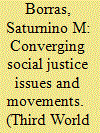

|
|
|
|
|
| Summary/Abstract |
We argue that the multiple contemporary converging crises have significantly altered the context for and object of political contestations around agrarian, climate, environmental and food justice issues. These shifts affect alliances, collaboration and conflict among and between state and social forces, as well as within and between movements and societies. The actual implications and mechanisms by which these changes are happening are empirical questions that need careful investigation. The bulk of our discussion is dedicated to the issue of responses to the crises both by capitalist forces and those adversely affected by the crises, and the implications of these for academic research and political activist work. More specifically, we explore four thematic clusters, namely (1) class and intersectionality; (2) sectoral and multisectoral issues and concerns; (3) importance of immediate, tactical and concrete issues of working people; and (4) links between national and global institutional spaces and political processes. We know only a little about the questions we framed here, but it is just enough to give us the confidence to argue that these questions are areas of inquiry that deserve closer attention in terms of both academic research and political debates and actions.
|
|
|
|
|
|
|
|
|
|
|
|
|
|
|
|
| 3 |
ID:
171503
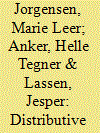

|
|
|
|
|
| Summary/Abstract |
To address increasing opposition to wind projects in Denmark three compensation schemes were introduced in the 2008 Renewable Energy Act. The aim was to address issues of distributive fairness and thereby to increase local acceptance. This paper analyses the role of two individual compensation schemes – the property value-loss scheme and the co-ownership scheme – on local citizens’ perceptions of fair distribution of the benefits and burdens of wind energy projects. The qualitative case study of three Danish wind energy projects discloses that distributive unfairness was a prevalent concern among local citizens, and that this concern was inseparable from perceptions of procedural fairness and recognition. The key conclusion is that the two compensation schemes are not successfully offsetting perceptions of unfair distribution. The schemes are challenged by a multitude of intertwined concerns. The compensation schemes are not equipped to address the plethora of non-monetary values affected by the wind projects. Specifically the compensation schemes are criticised for not offering adequate local benefits or distribution thereof, equal access, fair procedures and transparency. In fact the schemes were by some considered unfair and created perceptions of lack of recognition and bribery which undermined their role in promoting distributive fairness and local acceptance.
|
|
|
|
|
|
|
|
|
|
|
|
|
|
|
|
| 4 |
ID:
173818
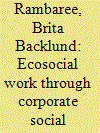

|
|
|
|
|
| Summary/Abstract |
This article presents a case study of corporate social responsibility (CSR) in coastal areas of Mauritius where company CSR work has brought new ways of engaging with communities. The study examines in what ways companies are involved in ecosocial work and what the challenges and possibilities are from an environmental justice perspective. Based on interviews with representatives of companies and other organizations involved with CSR the study shows that CSR involvement in ecosocial work may bring possibilities for advancing environmental justice for local communities as it can enhance resources and capacity building, as well as bring actors together and play a role in advocacy and empowerment work. Challenges include that companies may have difficulties in contributing to greater justice in terms of community involvement. Moreover, inequalities and substantial environmental justice issues, such as access to land and safe housing, are difficult to fully address through a CSR framework.
|
|
|
|
|
|
|
|
|
|
|
|
|
|
|
|
| 5 |
ID:
170226
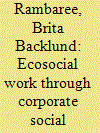

|
|
|
|
|
| Summary/Abstract |
This article presents a case study of corporate social responsibility (CSR) in coastal areas of Mauritius where company CSR work has brought new ways of engaging with communities. The study examines in what ways companies are involved in ecosocial work and what the challenges and possibilities are from an environmental justice perspective. Based on interviews with representatives of companies and other organizations involved with CSR the study shows that CSR involvement in ecosocial work may bring possibilities for advancing environmental justice for local communities as it can enhance resources and capacity building, as well as bring actors together and play a role in advocacy and empowerment work. Challenges include that companies may have difficulties in contributing to greater justice in terms of community involvement. Moreover, inequalities and substantial environmental justice issues, such as access to land and safe housing, are difficult to fully address through a CSR framework.
|
|
|
|
|
|
|
|
|
|
|
|
|
|
|
|
| 6 |
ID:
181446
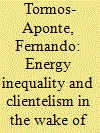

|
|
|
|
|
| Summary/Abstract |
Do social vulnerabilities and ruling party support shape government responsiveness in times of disasters? The 2017 hurricane María territory-wide power outage, the second longest in world history, is a tragic natural experiment that provides a unique opportunity to examine the determinants of government responsiveness during disaster recovery processes. We use data on power restoration crew deployments (N = 18,614 deployments), a novel measure of government responsiveness, and a new social vulnerability index to assess the determinants of government responsiveness in the wake of disasters. We find that communities with ties to the ruling party elicit greater government responsiveness while socially vulnerable communities are less likely to be prioritized during the disaster relief efforts, controlling for disaster damage as well as logistical, economic, and essential service recovery priorities. Existing power restoration policies place larger burdens on marginalized communities, motivating the need for including power restoration to vulnerable communities among restoration priorities.
|
|
|
|
|
|
|
|
|
|
|
|
|
|
|
|
| 7 |
ID:
183573
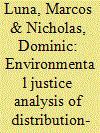

|
|
|
|
|
| Summary/Abstract |
A growing body of research shows that natural gas leaks at the distribution level are much more common and extensive than previously thought. Although scholars and advocates have raised alarms about the climate change and economic significance of these leaks, there has been little consideration of the problem from an environmental justice perspective. Using recently available high resolution leak data, this analysis of natural gas leaks across the state of Massachusetts shows that People of Color, limited English speaking households, renters, lower income residents, and adults with lower levels of education are disproportionately exposed to natural gas leaks and that their leaks take longer to repair, as compared to the general population, and particularly as compared to White residents and to homeowners. This pattern is evident for all leaks in the state, for leaks disaggregated by leak class or grade, and for leaks disaggregated by utility. This analysis shows that natural gas leaks are an environmental justice issue warranting further study and policy attention.
|
|
|
|
|
|
|
|
|
|
|
|
|
|
|
|
| 8 |
ID:
187015
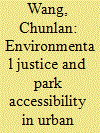

|
|
|
|
|
| Summary/Abstract |
This article applies the pluralistic concept of environmental justice to the issue of park accessibility between people across different socioeconomic strata in the metropolitan region of Shanghai. Data were obtained from China's 2000 and 2010 population census, Shanghai Landscaping and City Appearance Administrative Bureau, semi-structured interviews and secondary sources. The article finds significant environmental injustice between foreign citizens and Chinese citizens (including people from Hong Kong, Macau and Taiwan and mainland people with and without Shanghai hukou) and between blue collar, white collar and wealthy white collar people from distributive, recognition, participatory and procedural justice perspectives. The article then discusses why such injustice is the result of urban China's unique authoritarian mode of governance, power structure, neoliberal practice and globalisation development. The findings offer insights into the development of the concept of environmental justice in the Chinese context and the country's objective to build an impartial society.
|
|
|
|
|
|
|
|
|
|
|
|
|
|
|
|
| 9 |
ID:
187017


|
|
|
|
|
| Summary/Abstract |
Coal-fired thermal power has recently become one of the most pressing issues in Vietnam's development agenda. The country's economic development, industrialization and modernization, and population increases have put increasing pressure on energy demands. The Vietnamese government sees coal-fired power as a way forward in ensuring energy security, which had led to the planning and construction of plants nationwide, particularly from 2016. Simultaneously, a growing anti-coal power development movement argues that coal-fired power adversely transforms local people's lives and livelihoods, and negatively impacts the ecological balance in plant locations. Through the lens of environmental justice, this paper examines the development of Vietnam's power sector with a focus on coal-fired thermal power and its impacts on local livelihoods, food production and water resources. The paper argues that Vietnam's development of coal-fired power is about much more than energy. It speaks to the state's rule over resources, and how this very process of power generation disproportionately affects local communities in the Mekong Delta.
|
|
|
|
|
|
|
|
|
|
|
|
|
|
|
|
| 10 |
ID:
186473


|
|
|
|
|
| Summary/Abstract |
The development of Renewable Energies (RE) must be stepped up in the coming years if we are to successfully realise the ambitious energy transition challenge set by many governments across the globe. However, the energy transition is far from obvious, especially with regard to the social acceptability of RE. In this context, we used a Discrete Choice Experiment combined with a Geographical Information System to assess the willingness of individuals to switch to a more virtuous energy mix based on three energy sources (wind, photovoltaic and biogas). Our results show a dominant generational effect, indicating that young people are more likely to accept renewable energy in their neighborhoods. Furthermore, residents in areas with renewable energy with negative externalities (wind turbines and anaerobic digestion units) tend to have a lower Willingness to Pay than residents in other areas, which is what we call the principle of territorial distributive justice. There is no reason to believe that the difficulties in finding new locations for RE installations could fade away. Therefore, an increased effort of public policies to plan the location of future RE facilities in a more equitable way and always a better explanation and co-construction of new RE projects are needed.
|
|
|
|
|
|
|
|
|
|
|
|
|
|
|
|
| 11 |
ID:
046130


|
|
|
|
|
| Publication |
London, Earthscan, 2003.
|
| Description |
xix, 347p.
|
| Standard Number |
1853837296
|
|
|
|
|
|
|
|
|
|
|
|
Copies: C:1/I:0,R:0,Q:0
Circulation
| Accession# | Call# | Current Location | Status | Policy | Location |
| 046626 | 344.046/AGY 046626 | Main | On Shelf | General | |
|
|
|
|
| 12 |
ID:
154720


|
|
|
|
|
| Summary/Abstract |
At the turn of the millennium, inhabitants of a small Karen village situated in one of Thailand’s UNESCO World Heritage Sites sought access to environmental justice in the Thai courts over industrial pollution that had contaminated their local stream with lead and caused them years of degraded health and social misery. The Karen villagers were only able to gain access to justice with the help of NGOs that served them as a support group during a period when Thailand was experiencing active civil and democratic awakening. The NGOs, which had a common cause with the Karen villagers, helped them enter the ‘environmental justice frame’ and its discourse. Their experience of lead pollution was framed within a moral ‘rhetoric of exposure’, which came to guide their activism against intransigent agencies and policies, as well as their mobilization for access to justice.
|
|
|
|
|
|
|
|
|
|
|
|
|
|
|
|
| 13 |
ID:
134414


|
|
|
|
|
| Summary/Abstract |
This article focuses on the growth and transformation of the movement against the expansion of science parks and electronics hazards in Taiwan. The author finds that the movement has brought about a strong overall trend against the industry’s expansion and has gradually raised significant concern for environmental justice in the past decade. Concern for environmental and social justice has been interwoven to frame the movement’s discourse and actions in the following three aspects: first, campaigning for procedural justice, democratic decision-making, and information transparency; second, campaigning for distributive justice of land, water, and environmental risk; and third, campaigning for the right of recognition.
|
|
|
|
|
|
|
|
|
|
|
|
|
|
|
|
| 14 |
ID:
169847


|
|
|
|
|
| Summary/Abstract |
For the last six decades, Turkish governments have been advocating the construction of a nuclear power plant (NPP) on the grounds that it is necessary for the development of the country, that the country needs nuclear energy for economic growth, and more importantly, that an NPP would mark a milestone in Turkey's journey of modernisation. However, national and local opposition has also existed from the beginning on. The first attempts to build an NPP in late 1970s were met with an immediate reaction from the civil society, concerned about potential problems such as NPP's impact on environment and health, waste management, and risk of nuclear accidents, giving rise to a long-standing conflict that is yet to be settled. In order to better understand Turkey's previous and current motivations to build a nuclear power plant, this study will first recount the country's history of nuclear power followed by a discourse analysis using a multidimensional environmental justice framework, which will investigate different stakeholders' views and perceptions, and the alternative policies proposed by them. The discourse analysis built on the historical narrative is helpful in identifying sources of conflicts between stakeholders, and in presenting these conflicts in a transparent and comprehensible manner.
|
|
|
|
|
|
|
|
|
|
|
|
|
|
|
|
| 15 |
ID:
125158
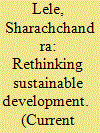

|
|
|
|
|
| Publication |
2013.
|
| Summary/Abstract |
The challenge for sustainable development thinking is to bring . . . somewhat disparate perspectives into at least a dialogue, if not a convergence.
|
|
|
|
|
|
|
|
|
|
|
|
|
|
|
|
| 16 |
ID:
150381


|
|
|
|
|
| Summary/Abstract |
The nuclear melt-down in Fukushima resulted in diverging energy policy decisions across the world where Germany decided to opt out of nuclear electricity production. Yet, the government’s decision-making framework for energy policy decisions does not accurately reflect important drivers for the strategy change. This paper presents the Energy Crossroads framework as a more comprehensive tool to analyse the drivers and impacts of the nuclear phase-out. 20 expert interviews were performed across business participants as well as policy makers in the national and international energy context. Results show that Germany has adopted an environmental justice, rather than energy security, stance in their nuclear phase out policy, with significant long-term consequences.
|
|
|
|
|
|
|
|
|
|
|
|
|
|
|
|
| 17 |
ID:
113428


|
|
|
|
|
| Publication |
2012.
|
| Summary/Abstract |
The reaction of communities to the development of energy facilities is based on the environmental impact of the investment, but it also reflects the ex-ante propensity of residents to engage in collective actions. In this work we have examined the requests of authorization of Italian power producers for new thermal plants with the purpose of testing the efficiency of market-based siting policies. The classical location factors, e.g., infrastructure availability, have been confirmed to play a role, and there is a weak evidence that authorization demands have targeted communities that suffer less environmental damage. However our findings have also revealed that power producers are likely to avoid potentially suitable sites if they host a highly activistic community. The paper also discusses some modifications concerning siting policies that could improve the alignment between community responses and the environmental costs of new energy facilities.
|
|
|
|
|
|
|
|
|
|
|
|
|
|
|
|
| 18 |
ID:
150363


|
|
|
|
|
| Summary/Abstract |
The social-class dimension of energy consumption has been rather neglected relative to other theoretical approaches to energy use, despite its potential deployment in energy policies. This paper aims at investigating energy policy-related inequalities across social classes with respect to three dimensions highlighted by environmental-justice theories: income distribution, procedures producing unequal distributional outcomes, and cultural and political recognition of vulnerable and marginalised social groups. These inequalities can be exacerbated or reduced by social diffusion processes, both vertical and horizontal. These processes include policy instruments intending to lower energy consumption in the residential sector. To empirically ground the analysis, two countries with contrasting patterns of income inequalities, Portugal and Belgium, are compared on the basis of qualitative data collected in 2009–2011. We discuss the relevance of integrating the social diffusion dimension in energy policies and propose several policy instruments to do so. One of our main contribution is to argue that both vertical and horizontal diffusion across social classes, if adequately translated into policy instruments, can boost the uptake of residential energy retrofits and other energy saving practices.
|
|
|
|
|
|
|
|
|
|
|
|
|
|
|
|
| 19 |
ID:
155521


|
|
|
|
|
| Summary/Abstract |
A global movement is attempting to transform the legal systems that govern humankind’s relationship with the environment. Community Environmental Legal Defense Fund’s Mari Margil argues that we must stop treating the planet as if it exists solely for human exploitation and recognize the fundamental rights of nature.
|
|
|
|
|
|
|
|
|
|
|
|
|
|
|
|
| 20 |
ID:
190735
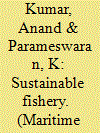

|
|
|
|
|
| Summary/Abstract |
The world ocean is a continuum that facilitates relatively free interchange among its parts and is of fundamental importance to studying environmental justice. Environmental justice sits within the larger ambit of social justice and equity. The article examines the effects of illegal, unreported, and unregulated (IUU) fishing within the Indian Ocean Region (IOR) on sustainability, and damage to the marine ecology, resulting in environmental and distributive injustice to the coastal communities. It also highlights the prevalence of IUU fishing on the high seas and in the exclusive economic zones (EEZ) of the coastal States vis-à-vis existing international fisheries laws. In addition, the article analyses the feasibility of managing the marine environment in the IOR through people’s participation, utilising the tenets of Commander’s Estimate of the Situation (CES), and suggests courses of action (CoAs) to achieve environmental justice. Further, it makes use of three case studies to assess the feasibility of people's participation in achieving sustainable fishing practices.
|
|
|
|
|
|
|
|
|
|
|
|
|
|
|
|
|
|
|
|
|